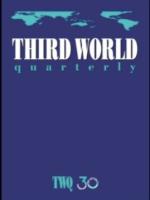Understanding contemporary changes in development cooperation
Exploring and theoretically explaining contemporary challenges of development cooperation requires an ever-growing conceptual tool box. Accordingly, the interdisciplinary nature of how development cooperation is studied means those of us engaged in it are required to continuously look for novel inspiration as we attempt to strengthen its analytical capacity and extend its theoretical foundations.
In this new article in Third World Quarterly, DIIS researcher Adam Moe Fejerskov argues that one of those sets of ideas whose prominence ought to be on the rise because of its increasing analytical, conceptual and theoretical strength, is that of sociological institutionalism. As in research on development cooperation, the notion of change is situated at the very heart of institutional thought.
The article identifies four broad categories of issues of central attention in the current study of development cooperation, and couples these with four avenues of sociological institutional research that may provide relevant theoretical and conceptual frameworks for further empirically exploring and theoretically extrapolating these. These are
- organizational fields for the study of new actors in development;
- translation and diffusion in the study of how ideas move in development;
- institutional logics to study dominant regimes of ideas in development;
- and finally institutional work and entrepreneurship to comprehend forms of institutional and organizational changes in the field.
DIIS Experts



